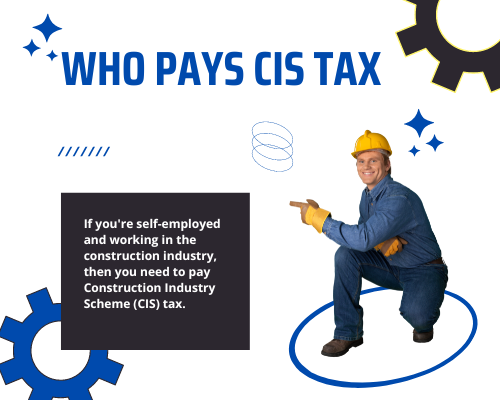If you’re self-employed and working in the construction industry, then you need to pay Construction Industry Scheme (CIS) tax. CIS is applicable to you if your business’s spending exceeds £1 million over the course of three years. This article will explain what CIS is, and how CIS tax works.
What is the Construction Industry Scheme (CIS)?
If you’re a sub-contractor or contractor in the field of construction it is important to be aware of the requirements in the framework of the Government’s Construction Industry Scheme (CIS). In essence, it is an approach like PAYE which will require contractors to hold back 20 or 30 percent of the amount of the subcontractors and transfer the deduction to HMRC.
The scheme is designed to achieve two objectives to cut down on tax evasion and fraud in the construction industry, and also to help subcontractors spread out their tax obligations across the entire financial year.
How Does the Construction Industry Scheme (CIS) Work?
The CIS (Construction Industry Scheme) was created in the year 2000 by HMRC to collect tax on income all year long from those employed in the construction industry. Construction companies pay tax on behalf of employees (subcontractors) and transfer the funds to HMRC in tax payments as follows:
- 20% for workers who have registered as a subcontractor with HMRC
- 30% for workers who haven’t registered as a subcontractor with HMRC
Be aware of the fact that CIS only applies to those who are employed in construction as a subcontractor, and you are been approved for CIS.
Example of How CIS Works
Eric James Ltd hires Smith Clint on their site as a subcontractor. Each month Smith is paid £2,000 in compensation for the work he does. Each month, the business is required to pay £400 (20 percent of £2,000) to HMRC as Smith’s taxes. The company then sends a CIS declaration as well as a payslip to Smith as proof.
The company then pays the remaining £1,600 to Smith to pay for his services.
How Do CIS Refunds Work?
CIS refunds work differently for sole traders/partners and limited companies.
Sole Traders and Partners
At the end of the tax year, sole traders and partners should send in their Self-Assessment tax returns as usual. They should record:
- The full amounts on your invoices as income
- Any deductions contractors have made in the ‘cis deductions’ field
- HMRC will work out their tax and national insurance bill and take off any deductions made by contractors.
If they still owe tax after this, they’ll need to pay it by 31 January following the end of the tax year. However, if you’re due a tax refund, HMRC will pay the money back.
Limited Companies
If you have gross payment status, then you should declare all your income in your Corporation Tax return as usual. If you pay CIS deductions, you must claim these back through your company’s monthly payroll scheme. Do not try to claim back through your Corporation Tax return because you may get a penalty if you do.
You should send your monthly Full Payment Submission (FPS) as usual to HMRC as well as an Employer Payment Summary (EPS). There you can enter the total CIS deductions for the year to date.
HMRC will take your CIS deductions off what you owe in PAYE tax and National Insurance. Pay the balance by the usual date. If your company’s PAYE bill for the period is reduced to zero and you still have some CIS deductions you have not been able to claim back, you should carry these forward to the next month or quarter (in the same tax year).
Claim A Repayment Online
If you are an agent, you will need to use the Government Gateway user ID you use to sign in to your agent services account to claim a repayment online. You can create an agent services account if you do not have one but you cannot access the Construction Industry Scheme repayment form agent services account.
If you submit your return before the filing deadline of 5 April, your records may not show all deductions for the previous tax year. This may cause delays or incorrect payment.
Claim By Post
Write to HMRC at:
National Insurance Contributions and Employer Office
HM Revenue and Customs
BX9 1BX
United Kingdom
Make sure that you include the following in your correspondence with HMRC:
- Your full company name
- Your PAYE reference numbers
- The reasons for the overpayment
- A completed r38 form if you want your refund to be paid to an agent or other representative
- Bank account number
- Sort code
- Account holder’s name
What Work is Covered Under CIS?
Construction work includes:
- Building work
- Roads
- Bridges
- Installing heating, lighting, power, water, and ventilation systems
- other civil engineering works
- Alterations, repairs, and decorating
What are You Required to Do?
Contractors are required to register for CIS. It is the duty of the contractor to deduct the proper amount of tax from subcontractors.
Note: you must verify that your subcontractors are registered with HMRC or not before you take this step.
- If they’re ‘Gross’ there is no tax deduction required;
- If they’re CIS registered, a deduction of 20% is required;
- If they’re not CIS registered a 30% deduction is required.
All deductions have to be made available to HMRC.
What is the Consequence If You Don’t Pay?
As a contractor, it is your responsibility to deduct the proper amounts of taxes from subcontractors. If you don’t properly inform HMRC of subcontractor payments, then you could be liable for a fine of up to £3000.
The return must be filed by the 19th day of every month for the tax. For example, the June returns have to be submitted before the 19th of July. Late returns may result in penalties beginning at £100 for each day missed.
Is there a Simple Method to Get Rid of All This?
Yes. It’s known as “Advantax Accountants”! We manage all administrative tasks to ensure that you’re completely in compliance with HMRC. It’s your lucky day. You can get the CIS tax returns prepared by a professional tax accountant. Our CIS accountants are experts in the field of the tax requirements of construction workers such as what expenses you are able to claim, ways to increase your profits, and much more.



